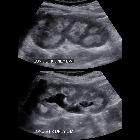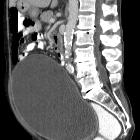urinoma
Urinomas, or uriniferous fluid collections, are urine collections usually found in the retroperitoneum, most commonly in the perirenal space, as a consequence of renal tract leakage caused by urinary obstruction, trauma, or post-instrumentation.
Terminology
As there is no definitive distinction between the terms urinoma and urinary leakage in the literature, the terms are often used interchangeably. This article will treat them differently with the former as a consequence of the latter, i.e. urinomas are encapsulated urine collections due to urinary leakage.
Pathology
As urine extravasates into the retroperitoneum, it can cause lipolysis of the surrounding fat with resultant encapsulation of urine, forming a urinoma.
Urinomas most often due to urinary obstruction secondary to :
- calculus
- ureteropelvic junction obstruction
- retroperitoneal fibrosis
- retroperitoneal malignancy
- cancer of the renal pelvis, ureter, or bladder
- a variety of conditions that cause bladder outlet obstruction
Urinomas also may be due to:
- abdominopelvic trauma, e.g. renal trauma or bladder rupture
- surgery, e.g. ureteric injury
- diagnostic instrumentation, e.g. ESWL or ureteroscopy
Location and morphology
- cystic mass in perirenal space: localized perirenal urinoma (most common)
- cystic mass filling entire perirenal space: diffuse perirenal urinoma
- sickle-shaped collection: subcapsular urinoma
- encapsulated expanding intrarenal cystic mass separating renal tissue fragments: intrarenal urinoma
Radiographic features
Fluoroscopy
Intravenous pyelogram
Contrast extravasates outside of the collecting system, into the surrounding retroperitoneal tissues.
Ultrasound
Presents as a thinned-walled anechoic collection usually found partially contouring any portion of the renal tracts.
CT and MRI
On CT and MRI, a urinoma shows water attenuation, low signal intensity on T1-weighted imaging, and very high signal intensity on T2-weighted imaging, similar to simple fluid elsewhere in the body.
Urine leakage is usually directly demonstrated on contrast-enhanced studies on the excretory phase due to direct contrast extravasation from the urinary tract .
Treatment and prognosis
- small urinomas are usually treated conservatively
- larger, persistent or symptomatic urinomas: percutaneous drainage is often used with the treatment of the underlying cause of urine leakage
Siehe auch:
- perirenal space
- Retroperitoneum
- Ureterabgangsstenose
- Blasenentleerungsstörung
- retroperitoneale Fibrose allgemein
und weiter:

 Assoziationen und Differentialdiagnosen zu urinoma:
Assoziationen und Differentialdiagnosen zu urinoma:




